“It plummets into some very murky depths in terms of the human psyche”: Jamie Lloyd, Paapa Essiedu and Taylor Russell on The Effect
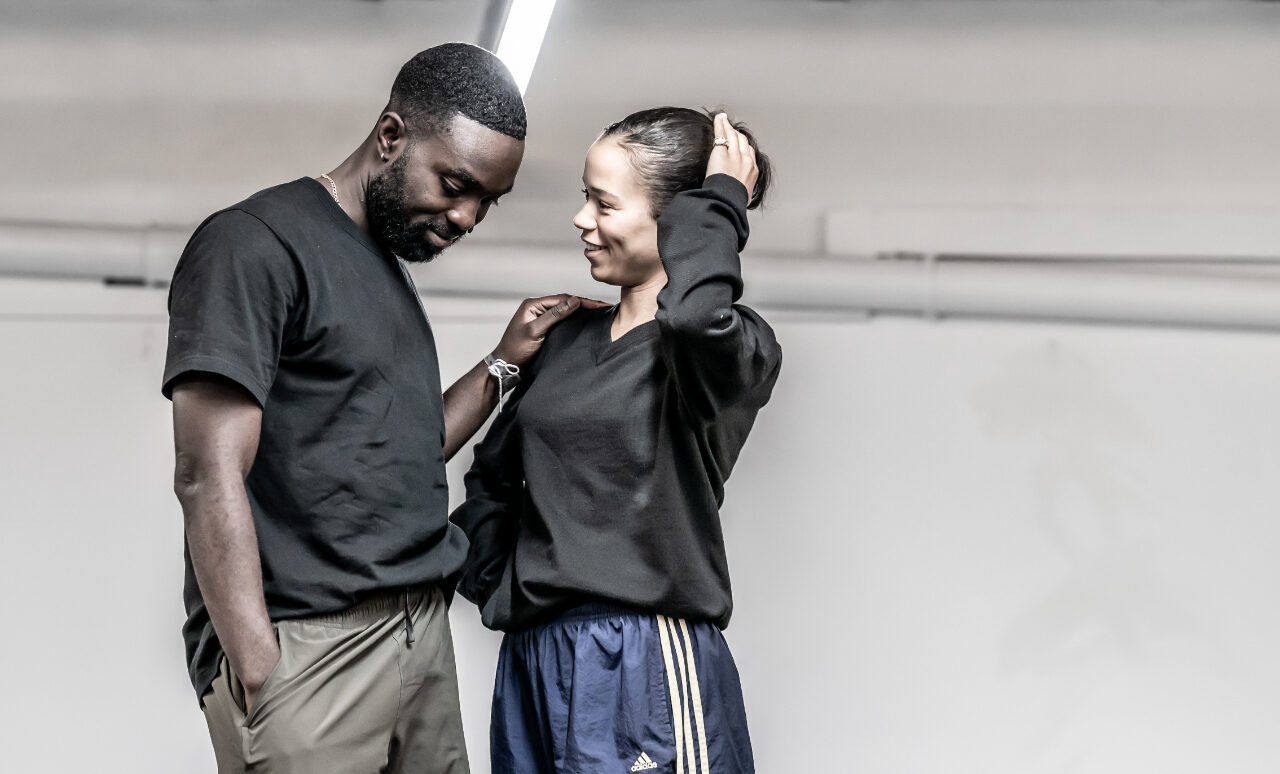
Written by Lucy Prebble (who recently made headlines as co-writer and executive producer of hit show Succession), The Effect was first performed in 2012. Volunteers in a clinical drug trial, Tristan and Connie end up falling in love, but are unsure whether their feelings for each other are real, or a byproduct of their medication.
From August until October, the play sees a London revival, staged by star whisperer Jamie Lloyd (whose latest credits include Cyrano de Bergerac starring James McAvoy, and A Doll’s House with Jessica Chastain), Once again, the director has managed to assemble a stellar cast, including Paapa Essiedu (Royal Shakespeare Company’s Hamlet and King Lear, I May Destroy You) and Taylor Russell (Waves, Bones and All), for whom this will mark her stage debut.
The Upcoming was invited to the rehearsal room ahead of the first previews, where we learned about the stage area the cast refers to as “The Grid”, and spoke to the talent about their work on this upcoming production.
What has the rehearsal process been like for you, so far?
Jamie Lloyd: No exaggeration, this has been one of the most special rehearsal periods of my entire career, with these two, and Michelle and Kobna, who are also in the play. It’s been such an amazing experience, and they are really gifted artists. It’s a privilege to watch them work every day. It’s a very open and collaborative and creative process and nothing but a joy. And also to work on Lucy’s play, which I think, has become a modern classic – it’s such an exceptional piece of work. It really allows us to dig deep into the human psyche and human emotion. And that’s very important to me, because I really believe that theatre is a place where we can learn something about ourselves and each other. And you absolutely do with your experience of this play. But you can only do that if you’ve got an amazing cast. And we really do. And so, it’s a joy to come to work every day.
Did you, the actors, have to take on particular research ahead of rehearsals?
Paapa Essiedu: I suppose one of the best things in this particular process is, we’ve had the playwright in the room. A play that existed for another iteration, we’ve allowed it to organically come towards us and it kind of represents where we are in 2023. And so, policy and the themes that we’re exploring in the play, sit in this time period versus 2012, when it came out. Obviously, Lucy has got a vast store of knowledge when it comes to context. So for us, what we’ve tried to do, is allow our play to kind of emerge in this room. I always purposely try not to bring too much stuff from outside: we’re trying to strip back as much as possible, to allow the play to really live and vibrate in a specific way. The creatives that put it together – it’s obviously built on their foundation of knowledge. But there’s so much discussion, like genuine collaboration. It’s really organic, instinctive and instinct-led.
Taylor Russell: I guess what’s been really exciting to me is that, from the beginning, we’ve had all these conversations around trials and different medications, learning about that too, which is stuff that I haven’t had a lot of prior knowledge of. There was a documentary we watched, the UK programme Panorama, about the history of different depression medications and the beginning of Prozac and how it affects people, how it affected people on trials and [those] still dealing with side effects now. And thinking about all the layers of that within the play, alongside exploring love, and what it feels like to fall in love with somebody, and how it can feel confusing in that, you don’t know where it’s coming from, and what’s real and maybe what you’re building up in your head. So it all kind of lives alongside each other – researching that part of it, having all these conversations about experiences with relationships and love – and it’s just been eye-opening and amazing. It feels very important to be talking about this stuff right now.
JL: It’s a highly intelligent play, and Lucy is a highly intelligent playwright. So there’s so much of that work for us. My feeling was never to get bogged down. Like, I can see another production bringing academics in for lectures for the cast and all that kind of stuff. Putting all sorts of stuff on the walls. But actually, it’s more about what’s going on spontaneously between these people, the physical and the emotional, and the visceral. The play does that and then we do this, and the combination of that makes something very exciting, I think.
Paapa just mentioned that Lucy was in the rehearsal room with you. Was this for the benefit of asking questions, or was there also a rewriting process? I believe I read that she wrote Taylor’s role specifically for Billie Piper at the time. Were there changes made to incorporate the fact this cast is made up of people of colour?
JL: What is amazing about Lucy – and I’ve never experienced this, ever, with another playwright – is that she writes around whoever is playing the roles. So, she actually wrote it for all of those people in the original cast. And each time that it’s been done – there have been various times around the world, this is the first major revival here – she’s always made it specific to those people. So getting to know who the actors are, speaking with the actors, she starts to shape that according to what feels appropriate to them. And also, what’s amazing is there have been lots of discussions with Lucy about specific scenes that have been rewritten in collaboration with the other actors. It’s just astounding. It’s the same thing throughout the production as well, she’s so open to a whole new approach. It has never been done in this way before, so it’s unlike any other production of the play. She’s a real collaborator in that way. It’s all about making it work in this particular moment, in this room, with these people. It’s an exceptional experience. And it matches my sort of theory, that I always ask actors to find themselves in the characters, and the character in themselves, so that it’s not like they’re putting on a role as kind of artifice, but it’s like they’re discovering something within themselves and bringing that to the world.
PE: Obviously my part was played by Jonjo O’Neill, who’s from Northern Ireland, and Taylor’s role for Billie Piper, who is from, I believe, Wiltshire or something like that. So there was the option for us to try that, but I think that was pushed aside quite quickly. Though Taylor does a good Wiltshire accent…
JL: She’s got a good variety about her. It’s very entertaining.
PE: She’s got a real wheelhouse. From Newcastle to Kingston.
JL: They all sound the same.
PE: But yeah, Lucy has been intimate to our process, but not like, intrusive: she doesn’t interrupt. She does this thing where she’ll sit at that table in the back with her laptop, and she’ll be kind of typing, pretending she’s not watching, and then she’ll come in and just like that, she cracks open something that we were struggling with. She is so insightful and outward-looking in her process. She’s not trying to make us do her play. She’s trying to bring her play to us, and allow us to make it something new, something specific to us. It’s been a real joy. You don’t always get that with writers in rehearsal rooms, basically. Writers are very important, specifically now, but there’s something about that collaboration within creative teams that produces the most exciting and dangerous and rewarding work.
When the characters are created so closely around you, what is your process to exit and to enter, to be able to leave the character at the end of the day?
TR: I don’t fully have an answer for that. Part of me feels like it takes a long time to figure that out. With any project or character, it would be nice for it to be so cut and dry. But it often is kind of messy. What I’m finding in this process, which I really feel grateful for, is that with Paapa, there was a really nice connection. I think we talked about this yesterday, just as long as you make it about your scene partner that you’re acting with, being as present with them as possible, hopefully, it is just bottled within that space. And then when you need that, it feels separate in its own way. Which is mysterious. I don’t really know how that works. But I think it’s an evolving thing, too. And I know that there are people here within the company, and the National Theatre, set up to help us with processing big feelings and big ideas, that are coming up, like mental health facilitators.
JL: Yeah, there are discussions with heavy stuff to unspool. And a lot of the conversations around that are sensitive. I think I’m constantly saying, “It’s not just the actors, it’s everybody involved.” We tend to forget, everybody in this room – we don’t know what’s going on with any person. So there’s this whole support network for sure, a place to give anyone the support that they need. And certainly, there are ways that the other actors have talked about as well, their sort of ways of decompressing after the show, which I think is very necessary. Because it does plummet into some very, very murky depths in terms of the human psyche. So it really is necessary to protect everybody involved. The way we get to production – because we’re taking away a lot of circumstantial detail, set, props – nothing is literal about what we’re doing, to recreate the emphasis on the actors. So there’s a real precision and focus and discipline, they have to connect and connect very, very easily. And then they are playing, because it’s also a very joyful play in many ways and it’s a funny play and it’s about the spontaneity between them.
PE: The way it’s built into the structure of how we work is what makes a big difference. We have relatively short days of rehearsals. Sometimes you have plays where you come in at 9:30am and you rehearse until 6:30pm, and it’s just about doing it again and again and again. Here, because we have a slightly longer rehearsal process – you’ve got that five and a half weeks – and the way Jamie works, is we turn up on the first day, already knowing our lines. So a lot of the anxiety that I usually associate with the rehearsal process, is the thing of trying to figure out what’s on the page, where am I standing or what prop am I holding, all of that stuff is kind of taken away by the process. which allows the facilitation of what Taylor was talking about, which is just like, connection, building that connection, and deepening it. It’s not necessarily about repetition, repetition, repetition, but about drafting, re-drafting and embedding and coming back to it. And that allows me at least to not get so lost in the minutiae of like, “Why did I say that line like that?”, and the need to do it again. Then, I think the challenge for us is to carry the relations, the motivations, into the show eight times a week. And a different audience is a different audience, you don’t want to play the same show twice. You want to respect the newness of the audience. For me, it’s all about how you structure these things. That’s what allows you to make a separation between the stress of the session, I guess, work, and the fact that there’s a world out there, that our lives are out there.
Is there anything you do to actively lighten the mood during rehearsals?
JL: We play music in the rehearsal room, there’s like dance and movement, so that it doesn’t feel like this kind of cerebral… I think, sometimes people think of theatre as being dry, boring and self-indulgent, whereas I always say, “We’re gonna take the work seriously. We’re not gonna take ourselves seriously,” and that very much is the spirit of the room. There’s a lot of laughter, a lot of banter, and you know, Taylor’s English accents really do that especially…
TR: I’m learning. I’m trying to pick it all up!
JL: Yeah, she’s amazing. She comes in with the lingo, she comes in with some London lingo.
TR: I am better at that than with accents.
JL: What was that, when you…
TR: Bangers and mash!
JL: Yeah, she just came out with it. “Let’s have a tea break!”, “Bangers and mash!” And we were like, “I’m not sure that’s the right context…” but she just throws it out now and again.
TR: I’m just testing the waters. Seeing what sticks. Okay, no, that one didn’t work. I’m retiring her.
JL: We’re gonna get that on a T-shirt: “Bangers and Mash. #theeffect.”
TR: That’s gonna be our official merch opening night. So yeah, it’s silly a lot of the time, or I just feel silly.
JL: No, but that’s the aspiration, is to try and create a room where everyone is totally comfortable, totally free and confident. As opposed to just pretentious and indulgent. Theatre can be like that sometimes and I’m over that.
Paapa and Taylor, what was the process for the two of you to build this intimacy to portray on the stage?
PE: It’s funny actually, the first day that we met was when we shot the trailer and the poster of the show, which is quite intimate. Up until then, the extent of our relationship was voice notes on WhatsApp. And then to be immediately…
JL: Really close, really close-up.
PE: Yeah. I think we’ve got fairly similar approaches to work, and approaches to life, maybe even. I feel very blessed to have been met by someone who is so open and so up for it and honest, because I think those are things that don’t come for free in collaborators. There are people who say they’ll be one thing, but do a different thing, or people who are so self-involved, it becomes all about trying to break the artifice. But with Taylor, from the very first day, she’s always been so open and welcoming and challenging. And leading by example, as well. Both for how she is with me, and the way she works, when we’re on the grid. So I’ve actually found it really easy to build that into the scene, because it hasn’t felt like we’ve had to force it, or we’ve had to generate it, or we’ve had to pretend.
TR: I can’t imagine doing the play with anybody else, because of everything we built, but also that just felt like it was present from the moment of meeting each other. And I had reservations, because I’m new in this space, and you overthink things – at least I do – and I thought, “Maybe I’m not gonna fit in this way.” But from the very beginning, like sending voice notes and getting in touch and being so welcoming, like, “What do you need to know in London?” Or “How can I help? I’m here, I’m so excited to be doing this with you.” Maybe, had we just met on that day, it would have been fine. But it felt like there was already a web building of safety between us, an acknowledgement. And that meant a lot to me and helped me feel really at peace within this process. And walking through this with you, and knowing how much knowledge you have, how sensitive you are, how gentle, I’ve never felt like anything that I would say or would do, would be silly or perceived as something that it wasn’t. And that’s to do with the person that Paapa is and the space that he creates for the actors around him. I mean, even in the room ,he’s always connecting and looking at everybody and being super, super present. I admire that a lot about him, and it shows in our relationship. So I’m incredibly grateful to have him there. To know, if I’m lost, all I need to do is just connect with my friend here. We’re doing this together and it’s all gonna be okay. It’s such a gift to have that connection with the people that you’re working with. I feel the same thing with Michelle and Kobna, too: everyone in the room feels so held in this space of gentleness and ease, but also pushing and transforming and moving forward. I think it’s a very special space. I don’t know what other rooms are like, but you can feel that this is a particularly unique and special one.
Jamie, what would you like the audience to take from this play?
JL: What’s amazing, is that it’s very intimate. The actors are very closely mic-ed throughout, and they are in this room, too. It means that they can speak more intimately than even we are now. And that’s really about stripping away to real bare-bones honesty. And again, it means that wherever you’re sat in the auditorium, it’s very democratic, wherever you are, you have this immediate connection with the actors. So they’re up close and personal, in your mind, in your ears. It creates this real interaction between the people in the auditorium and the people in this space. And it’s my job to get out of the way of that connection, or increase that connection, rather.
At the same time, there is a compulsive energy in the play. Because of course, we’re dealing with dopamine, and the effects of falling in love. And that can be really thrilling and exciting. So there’s a real energy in the play. I read the play first at the same time I went to see Kendrick Lamar at the O2 twice. There was something about this experience – maybe it’s the dopamine kick – but for me, there was the energy of a hip-hop gig in this play. In my mind, anyway, I don’t know whether anyone else reads it like that. But it’s that combination of very intimate and hugely energetic.
Theatre is a space to learn something about ourselves. About seeing our own minds, seeing all our nonsense, our delusions, as well as all of our positive qualities. And what’s interesting is that the play, obviously is set in a drug trial, right? So there are two people that are being analysed, that are being almost dissected, if you like. We’re performing on two sides of one space, so we are transforming Lyttelton Theatre for the first time ever, and it’s very much like the audience are witnessing this trial, and therefore analysing this trial, seeing the minds of the people on the trial, and also the doctors, and therefore, connecting very deeply and seeing something about themselves.
Everything we’re doing is to try and ensure that the audience are co-authors in the experience. So that means there’s no literal hospital bed, there are no props, everything needs to be in the imagination. So the idea is putting the emphasis on the actors and on the words and on the emotional psychological journey.
It means that the audience has to fill in the gaps. They have to radically listen. What I mean is listen with every cell of their being, not just their ears. If they take it within themselves, if they engage in their imagination, then it means that they have to internalise it themselves, that’s the theory. They breathe with the actors. The grid is this energetic connection between us all, and the audience are on the grid with the actors. And then maybe they start to question their own lives and think about how they behave and how they are in the world. So that’s the kind of lofty aspiration.
Selina Sondermann
Images: Marc Brenner
The Effect is at the National Theatre from 1st August until 7th October 2023. For further information or to book visit the theatre’s website here.

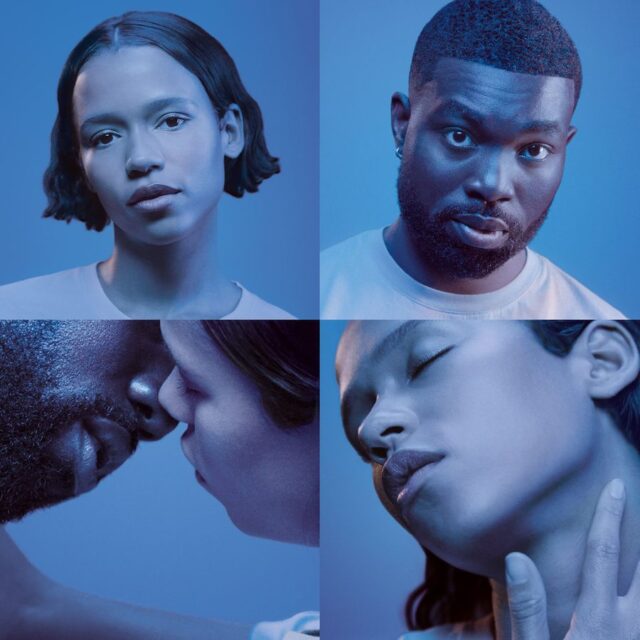
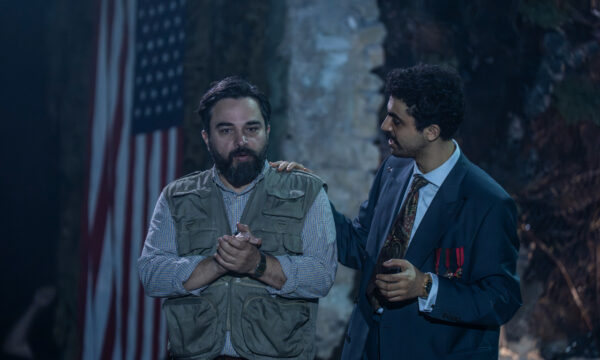
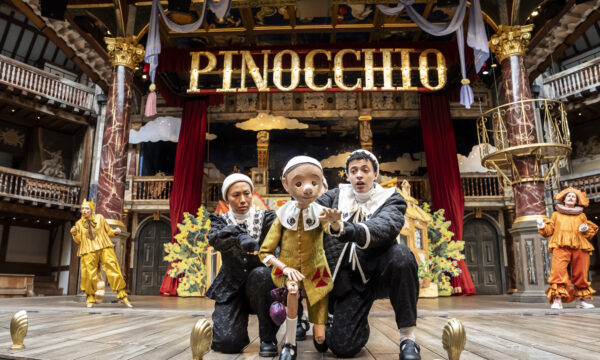
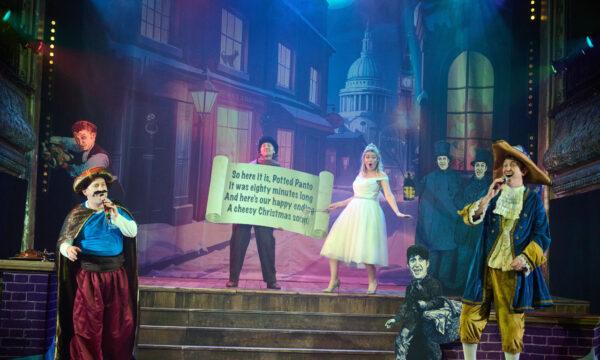

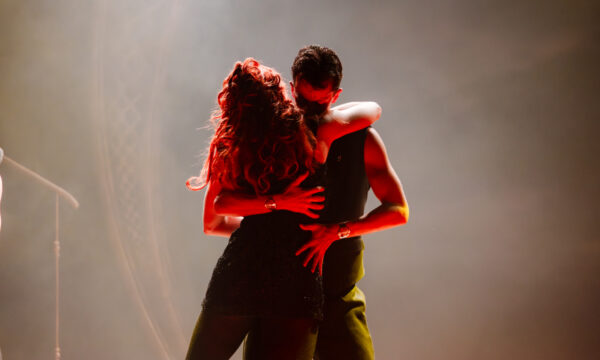
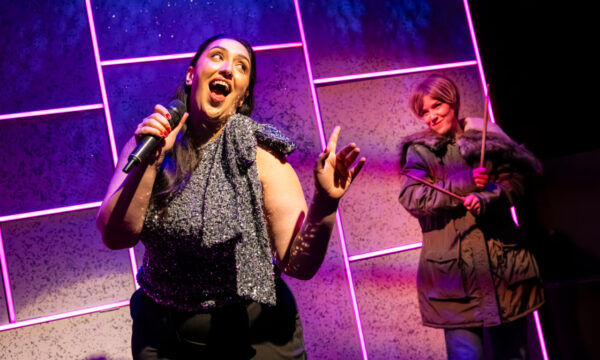
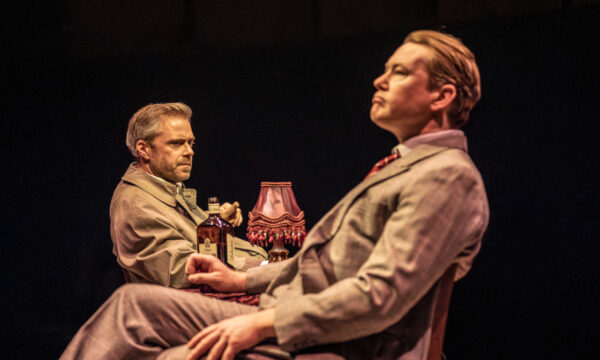
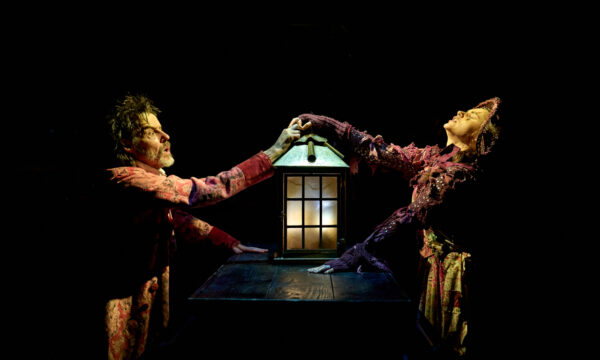
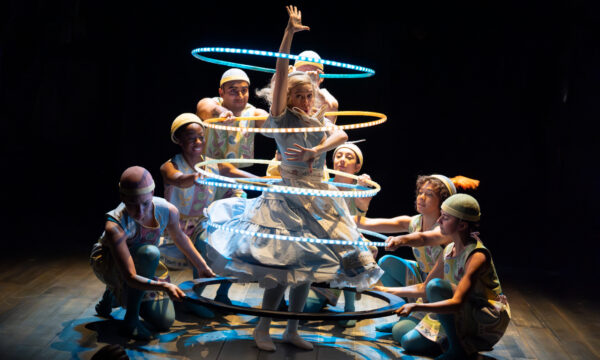















Facebook
Twitter
Instagram
YouTube
RSS